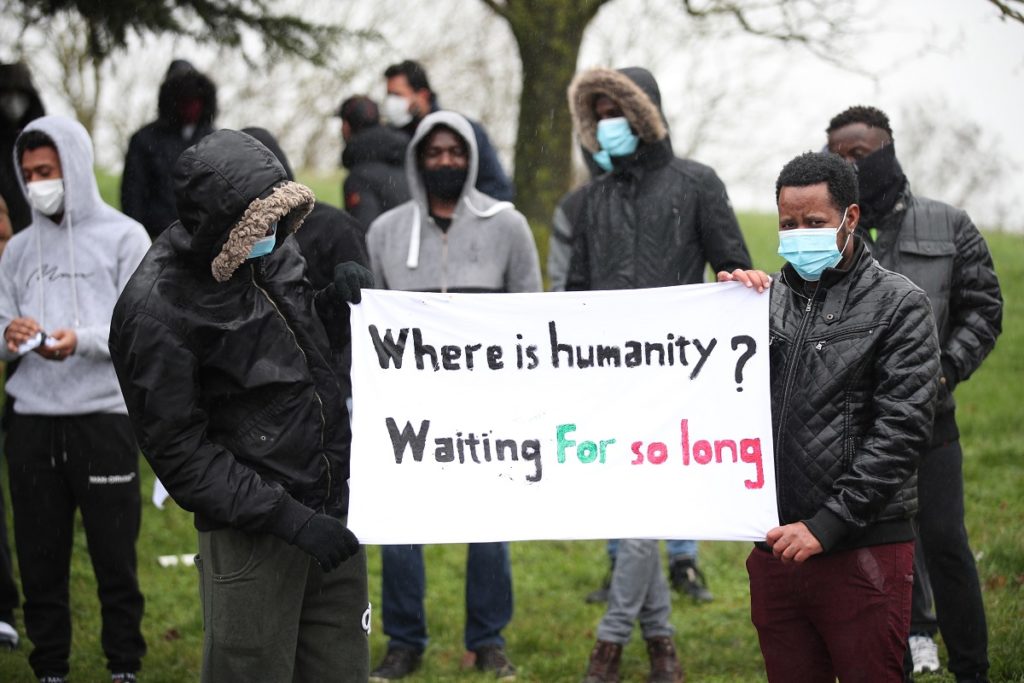It’s something we all take for granted – at least one decent pair of shoes. Without proper shoes, we couldn’t go for our daily walk, a staple of pandemic times when we had to endure months of lockdown. We couldn’t catch the bus, attend a medical appointment or do any everyday activities. We’d end up with dirty, cold, sore and blistered feet.
Yet, for people seeking asylum in temporary hotel accommodation, this has been all too common throughout the pandemic. And it hasn’t just been shoes, many people seeking asylum didn’t have a coat, or any change of clothes at all. Most of them arrived in the UK, after fleeing war and persecution, with literally the clothes on their back. You don’t have the luxury of packing a suitcase when you’re fleeing civil war and terrorism, you just use whatever means of escape you can, hoping that you’ll somehow survive and find a safe, welcoming country where you can offer your skills and have a chance to rebuild your life.
The UK should be a safe, welcoming country for people seeking asylum. As the fifth richest country in the world, we certainly have the resources to provide the very basic level of support that people seeking asylum need in order to survive while they wait for their claim to be processed.
The home secretary repeatedly insists that ‘fairness’ is at the heart of the government’s asylum policy. Yet we have found that people are being treated with a lack of compassion and humanity in temporary hotel accommodation, where those seeking asylum are increasingly being housed while the pause on evictions temporarily saturates the asylum support system. Take, for example, the single mother whose three children could not eat the terrible food they were given in the hotels, leading to one of her children being admitted to hospital. Or the man with underlying kidney problems and insufficient access to drinking water. To them, their treatment feels far from being fair.


The Refugee Council has been providing support for people who have been placed in hotels for over a year, and they have told us that the confinement feels like prison, and they feel ‘abandoned and forgotten’. Deteriorating mental health is common, with people self-harming and experiencing suicidal thoughts. This is sadly not surprising, given what they have had to endure.
After fleeing trauma and violence in their home state, and often in transit to the UK, they have been placed in low-budget hotel rooms commonly in the middle of nowhere with no cooking facilities. Many have no mobile phone, no change of clothes and very limited access to healthcare and legal advice. They are banned from working, so there is nothing they can do to improve their situation.
This isn’t the ‘Global Britain’ we want to see, with people being deprived of their dignity to such an extent that they consider taking their own life. We can do better than this.
A fair asylum system, where people are treated humanely while they wait for their claim to be processed, is not difficult to implement. It does not mean people are living in luxury; rather that they have access to basic things like a pair of outdoor shoes, access to a GP and food that meets their nutritional needs. No one should be suffering because they have no money and therefore can’t buy plasters or a pack of paracetamol.
At a time when the government is consulting on its new immigration plan, which proposes building reception centres where all people seeking asylum will live while waiting for a decision on their claim, it should look at the mistakes that have been made during the pandemic. As the Windrush Lessons Learned report stated, it is vital that when making decisions, the Home Office sees the ‘face behind the case’. Those who have sought safety in the UK must be able to live safely, healthily and treated with dignity.









